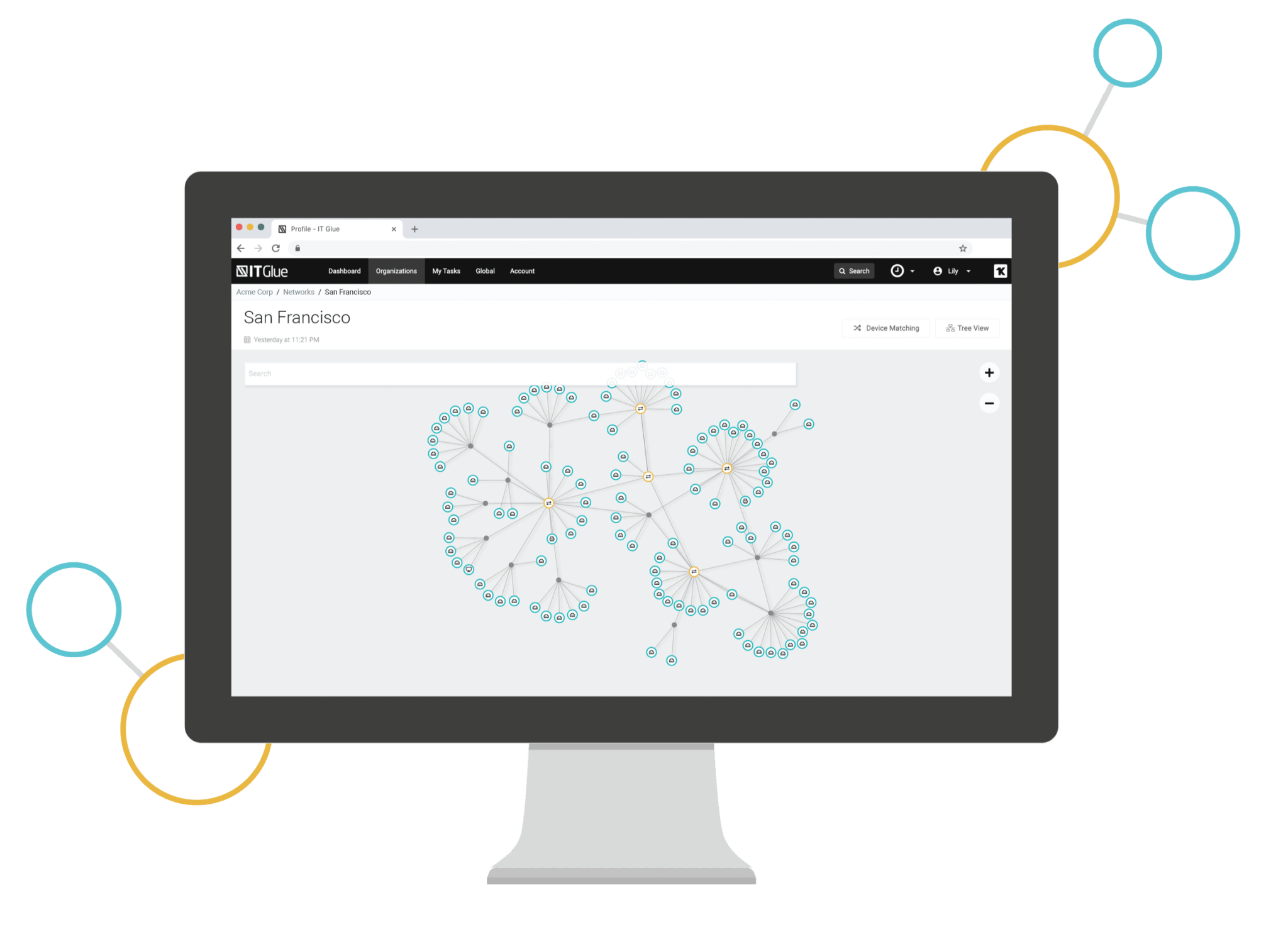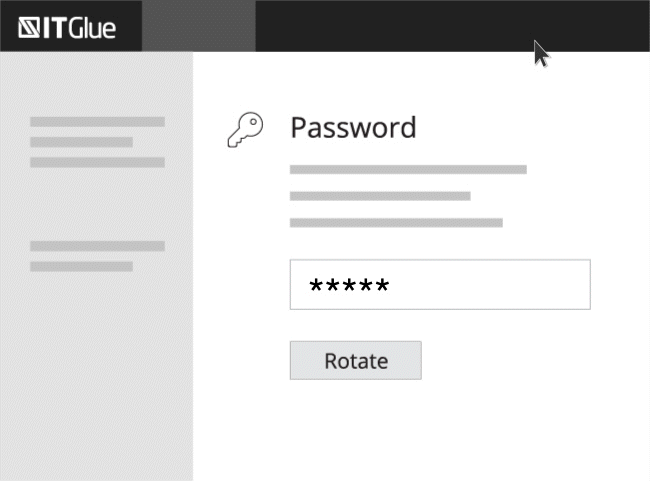Simplify Hardware Management With Device Expiration Auto-Documentation From myITprocess
Discover how IT Glue’s new myITprocess Device Expiration Auto-Documentation simplifies hardware lifecycle management and enhances IT efficiency.
Read Article
Leave the site walks to us. The Network Glue collector detects all devices on your clients’ networks regardless of vendor. It even discovers Active Directory environments including the AD role of each workstation and server, and automatically brings in AD users from on-premises or hybrid environments.
Say goodbye to hidden devices and incomplete user information. All network devices, as well as cloud, hybrid and on-premises user information from Azure AD and Active Directory are automatically documented and updated in IT Glue. This includes virtual components of networks for Hyper-V and VMware.
We can’t all be artists. Let Network Glue generate comprehensive network diagrams for you. Unique icons help to quickly interpret network diagrams, and are fully integrated with IT Glue so contextual information is pulled up when a device icon is clicked.

No more stale passwords. Enhance security and reduce credential stealing with automated password rotation for Microsoft Entra ID, Microsoft 365 and Active Directory. Enjoy seamless on-demand or scheduled password rotation on a per organization basis, minimizing human errors and saving valuable time.
Be proactive, not reactive. The information Network Glue provides empowers you to advise your clients on high-stakes issues like security.
Knowing your clients’ networks means that you know their areas of inefficiencies, too. You can then leverage QBRs as an opportunity to offer your strategic vision.
Speed up your onboarding process. Remotely. And with just a few clicks. The more documentation you have off the bat, the greater levels of service you can provide.
Visualize your clients network and interpret areas of weakness. Network Glue diagrams make identifying and troubleshooting issues simple and efficient.
Remotely install the Network Glue collector on your clients’ networks, and watch the magic happen.
The Network Glue blog covers tips and tricks on how you can leverage the power of network
documentation and automation to better service your customers.
Discover how IT Glue’s new myITprocess Device Expiration Auto-Documentation simplifies hardware lifecycle management and enhances IT efficiency.
Read ArticleDiscover how AI is transforming IT operations, from automated data capture to real-time updates, making IT documentation faster and more reliable.
Read ArticleDiscover IT Glue’s latest updates from Kaseya DattoCon 2024, featuring AI-powered automation, enhanced security and mobile improvements. Get a sneak peek of what’s next
Read ArticleDiscover how Cooper Copilot revolutionizes IT documentation with AI-driven automation, precision and efficiency. Explore real-world benefits and use cases.
Read ArticleSee what our partners are saying about Network Glue!

“Network Glue gives us the context so the on-call techs can easily zone in on devices and the information they need to very quickly know what’s going on.”

“We implemented Network Glue for 3 of our clients so far, and it has already given us a lot of network insights, such as devices and connections, that we never had before. We never bothered with the 3 networks that we just mentioned as it will probably take us at least two to three days of work.”

“Before Network Glue, network documentation was a multi-hour manual process. Now, this whole process is automated. The ongoing updates to documentation and diagramming is what we find the most valuable. When our on-site technicians make a change, they no longer have to remember to update the documentation and diagrams, and our help desk automatically sees these changes.”
Network discovery refers to the process that allows all the devices including computers to be discovered in a network. If you want to monitor your network infrastructure, this is the first step you have to incorporate into your system. By gaining visibility into the network devices, network administrators can have better control over device inventories, who can access the devices and how the devices communicate with each other.
The purpose of network discovery is to improve visibility into a network infrastructure. In any given network, there is a huge volume of devices connected with each other. New devices such as printers, routers, access points and switches are also frequently added to a network. Without network discovery, it is hard to keep track of all these devices. A network discovery tool helps you manage your network better and identify points of failure before they turn into actual issues.
When you have network discovery enabled, the data transmission between various devices in your network can be intercepted by a third party. This is called network sniffing. However, this can be prevented if you have strong encryption enabled in your network. The benefits of network discovery far outweigh the disadvantages. For instance, an invalid device connected to your network can be a hacker trying to access your network. When network discovery is enabled, you can track and prevent such unauthorized access.
A network discovery tool is a software solution that scans the network and discovers all the devices connected to it. Network discovery tools are commonly used to detect network overloading, network vulnerability, server issues, connectivity issues and more. Network discovery is not a one-and-done process. Network data must be gathered periodically without fail. A network discovery tool can be used to automate this process and detect or report any issues with the network.
A network discovery solution scans your network for IP addresses and subnets with the help of network protocols like SNMP (Simple Network Management Protocol). Once devices are detected with the help of their IPs and subnets, they will be automatically updated in the device inventory of your network. Robust network discovery tools like Network Glue also come with features like network diagramming to create a visual representation of how devices are connected in your network. This process is done continuously, and the network information is kept up to date.
In addition to network discovery, a network discovery tool should also come with strong automation and network diagramming capabilities. In today's complex IT environments, networks are getting more complicated than ever. You need a tool that automatically scans network devices and populates the information in your documentation software. Robust tools like Network Glue come with features like network diagramming to give you a visual representation of the network. Moreover, your network discovery software should be able to integrate with other popular tools in the market.